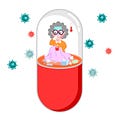90. Antidepressants are having a midlife crisis.
Prozac and I are the same age. Have we both passed our peak?
I have an ask of my audience. If you’ve purchased my debut memoir, MAY CAUSE SIDE EFFECTS, can you please head over to Amazon and leave a rating and review? Amazon likes 50 reviews keep the algorithm happy, which means it gets recommended to more people who need it. We’re at 40 reviews and working to get to 50 as fast as possible. Thank you!
Keep reading with a 7-day free trial
Subscribe to Happiness Is A Skill by Brooke Siem to keep reading this post and get 7 days of free access to the full post archives.


